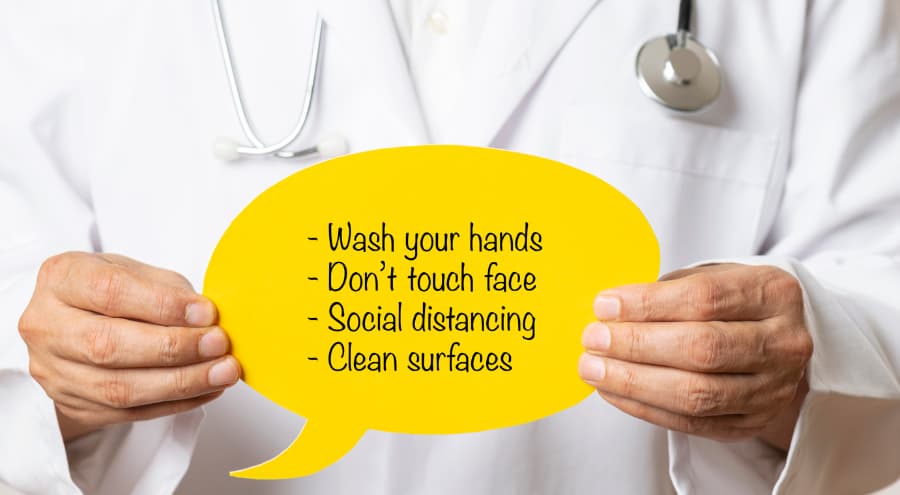
Whether you’re an essential worker or able to do your job from home, keeping yourself and your loved ones safe during the COVID-19 pandemic is critical. Our team at Thomas, Conrad & Conrad cares about the safety and well-being of our communities. These COVID safety tips can help you stay healthy and slow the spread of the virus.
Take Precautions to Help Stop the Spread Of COVID-19
After months of staying inside and communicating with loved ones remotely, people are anxious to spend time together in person. Still, it’s vital to be conscientious about COVID safety measures to protect yourself, your family, and friends.
By now, most people know that frequent hand washing, social distancing by staying six feet apart and wearing a mask in public all help to prevent the transmission of COVID-19. According to the CDC, the best way to avoid getting sick is not to be exposed to the virus, but that’s not always practical or possible.
Some ways that you can practice COVID safety include washing your hands with soap and warm water for 20 seconds upon returning home, using hand sanitizer that contains at least 60% alcohol, and avoiding touching your face.
Hand washing is critical:
- Before and after preparing food or eating
- After using the bathroom
- After changing a diaper
- After blowing your nose, coughing, or sneezing
- After handling or adjusting your mask
- After caring for someone sick
- After touching pets or other animals
Always sneeze or cough into your elbow, or better yet, use a tissue to cover your mouth and nose. Make sure to throw used tissues into the trash right away. Another way to practice coronavirus safety is to clean and disinfect frequently touched surfaces in your home and car daily with an EPA-registered household disinfectant.
Look Out for Symptoms
Monitoring your health and the health of family members is also a must. Keep an eye out for fever, chills, cough, shortness of breath, fatigue, new loss of taste or smell, headache, nausea, and other symptoms of COVID-19.
If you or someone in your household experiences these or other symptoms, stay home, and isolate yourself from others. Do not go to work or any other public places. Drink plenty of liquids, rest, and take over-the-counter medicines, such as acetaminophen, to help you feel better. Most COVID-19 cases are mild, and you should recover within 10-14 days.
If you are severely immunocompromised or concerned about your symptoms, call your doctor. Seek emergency medical attention if you or a loved one has trouble breathing, continued chest pain or pressure, bluish lips or face, confusion, or is unable to stay awake.
Visiting Loved Ones
If you choose to visit friends or family, make sure to take proper precautions, especially if they’re vulnerable to getting sick or are in a high-risk category. To make your visit safer, you may want to:
Socialize outside. Avoid spending time indoors with vulnerable loved ones. Close contact can easily spread COVID-19 from one person to another. Maintaining social distancing is much easier and more effective at preventing the spread of the virus in large outdoor spaces.
Keep the number of people to a minimum. Although the idea of a get-together might be appealing, keeping visits one-on-one or limiting the number of people getting together to less than 10 can help to ensure you and your loved ones stay safe.
Refrain from sharing food or drinks. It’s a good idea to bring your own food, drinks, and utensils when visiting friends or family. Make sure to take everything home with you or throw it out before leaving. Wearing a mask when you’re not eating or drinking provides an extra layer of protection.
Practice caution if you go inside. If you need to use the restroom, try to limit the surfaces you touch and make sure to wash your hands thoroughly afterward.
Make it a short visit. Keep visits to an hour or two. The longer the stay, the greater the chance of spreading COVID-19 if you have it.
If any of your loved ones have existing conditions that can lead to serious complications from COVID-19, it’s best to put off visiting, but make sure to keep in touch to avoid feeling isolated or depressed. Checking in daily via text, phone, or video chat can help keep all of your spirits up.
Contact Us to Learn More
The measures we all need to take to practice COVID safety may be inconvenient, but they are well worth it to protect our communities and the ones we love.
Thomas, Conrad & Conrad is open for business during these trying times, so if you need to schedule a consultation, contact us online, call us at 610-867-2900 in Bath, or contact one of our offices in Topton and Allentown, PA.

